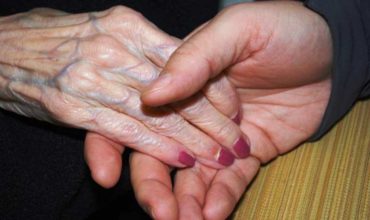Remember: your needs are important too! Caring for a loved one is an emotional task and caregivers commonly feel sadness, frustration, resentment, anxiety, anger and guilt. As a result of stress, many caregivers suffer from depression and their own physical ailments. It is important that you take time to take care of yourself, even if it is only a few moments here and there. Some tips:
- Eat well and get enough sleep. Common sense? Maybe. But when you are busy and stressed, it is easy to neglect the basics.
- Breathe. Deep breathing exercises and meditation can permanently change your physical responses to stress. Practicing 20 minutes a day can make the difference.
- Exercise. Taking time to exercise can also alleviate stress and help keep you healthy.
- Set boundaries. Learn to say no. Realizing your own limitations can make you more productive in the long run.
- Ask for help. Many caregivers think they have to shoulder the burden alone. Enlist the assistance of family members and friends.
- Plan for respite care. You may need a few days break (respite). If friends or family cannot fill in, respite care services may be available in the community. Under certain circumstances, Medicare will pay for a limited amount of respite care.
- Make time for fun. Do not turn down invitations from friends. If you take time to talk and laugh, it can help keep life in perspective.
- Be aware of the signs of caregiver burnout. It is time to take a break if you are feeling constantly irritated; ceasing to laugh; snapping at your loved one over little things; having crying fits or rages; or developing stress-related ailments, such as headaches, upset stomach or insomnia.
- Join support groups. You are not alone in your experiences. Finding out how other people have coped may be helpful.
- Do not neglect your health. Remember to see your doctor for routine check-ups and recommended screenings. And stay on top of managing any chronic health conditions you may have, such as diabetes.
National Organizations Helping Caregivers?
- The National Alliance for Caregiving (NAC): The Alliance is a not-for-profit coalition of national organizations focused on family caregiving. The web site has searchable databases of articles and guides for caregivers.
- Caregiver Action Network (CAN): CAN provides information and advocacy updates for caregivers, including a home healthcare primer and advice for communicating with healthcare professionals.
- National Family Caregiver Support Program (NFCSP): NFCSP is a government program that funds local agencies to provide information and assistance to caregivers caring for people aged 60 and over. Most of the local programs are overseen by Area Agencies on Aging (AAA). To find your local AAA, click on the Eldercare Locator link in the LINKS box.
- AARP: The national organization’s web site provides a range of resources for the elderly and for caregivers.
- Family Caregiver Alliance (FCA): FCA is a not-for-profit organization that offers programs at national, state and local levels to support and sustain caregivers. The group’s web site provides hundreds of articles with advice for caregivers. It also includes good disease-specific information.
- The Family Caregiver Program: Run by the Department of Pain Medicine and Palliative Care of Beth Israel Medical Center, the program provides counseling and support for caregivers, offers referrals to community resources, and conducts research and education initiatives. The program’s web site “NetofCare.org” offers online support, education and information on daily aspects of caregiving.
- Well Spouse Association: This national, not-for-profit membership organization gives support to wives, husbands, and partners of people with chronic illnesses and/or disabilities. Its web site hosts online caregiver chat forums and lists face-to-face support groups around the country.
- Caregiver Support Services: This Nebraska-based organization provides information and support for caregivers, and has listings for professional caregiving training programs. The group’s web site features an interactive stress test.
- National Caregivers Library: Hosted by Family Care America, this online resource has hundreds of articles for caregivers.
- Next Step in Care: NextStepInCare.org provides information and advice to help family caregivers and health care providers plan safe and smooth transitions for patients. All materials for family caregivers are available in English, Spanish, Russian, and traditional Chinese.
Source: Medicare Interactive






